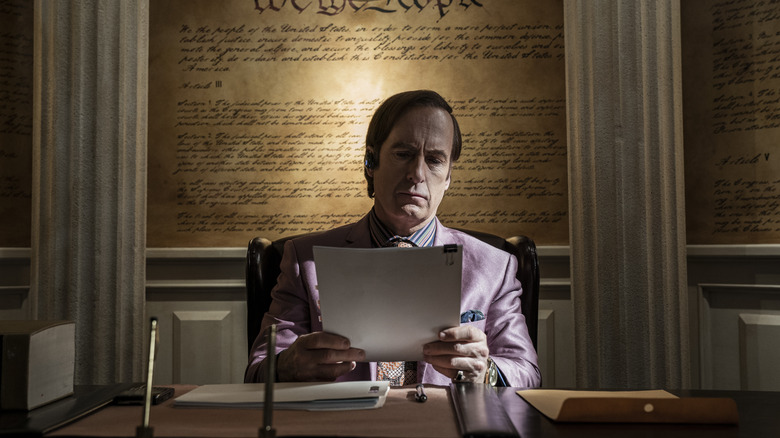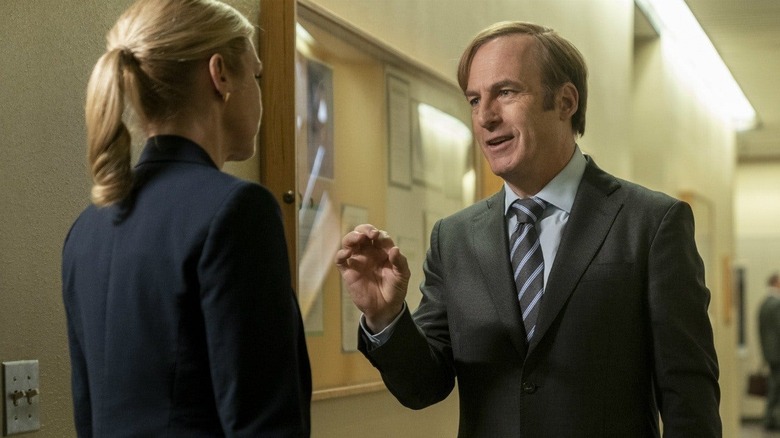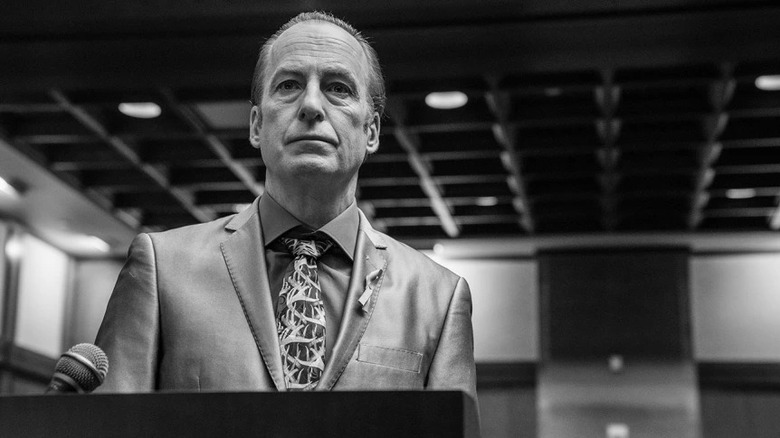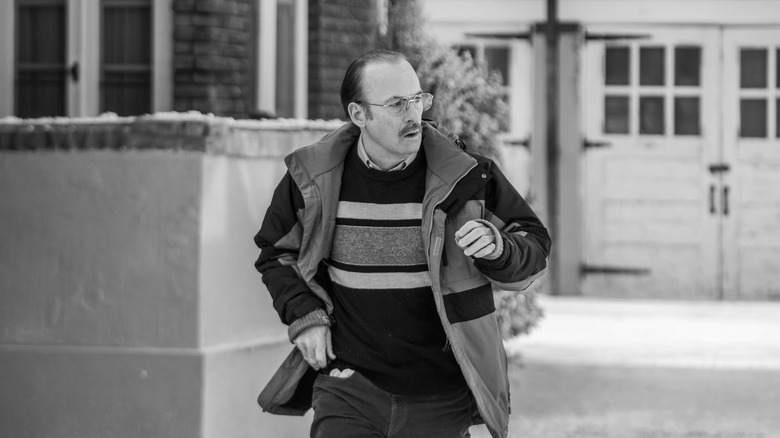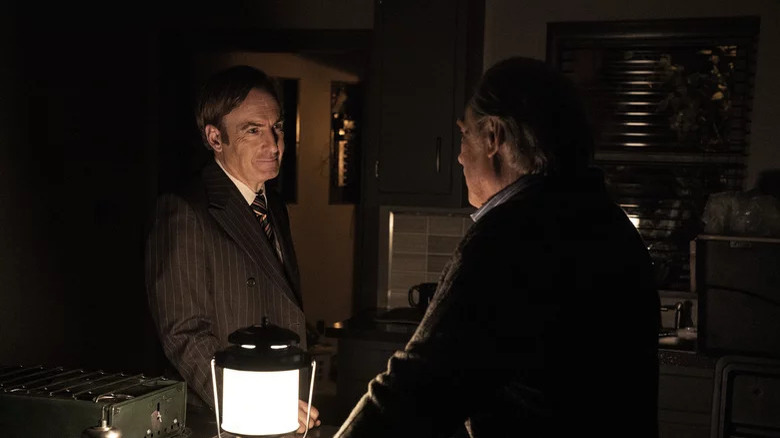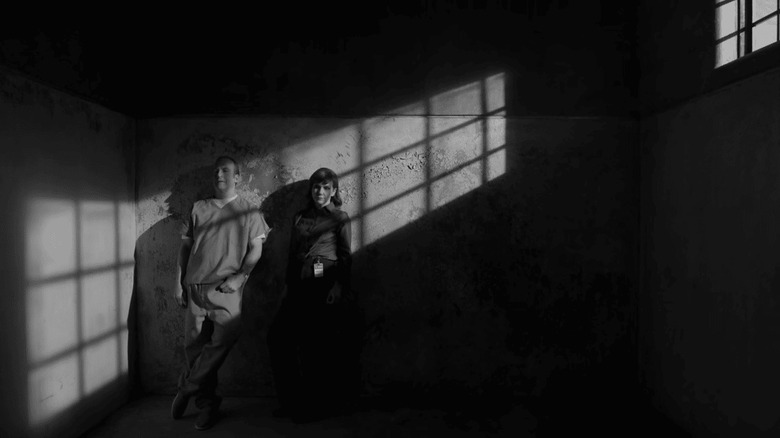Better Call Saul Ending Explained: What Would You Do If You Had A Time Machine?
What separates a good man and a bad man? It's a question Vince Gilligan and Peter Gould have interrogated across both "Breaking Bad" and "Better Call Saul" — the idea of the thin line that divides the legal and illegal, the moral and amoral, and how slippery the slope between them can be. And over the course of the six seasons of "Better Call Saul," we saw a man who gleefully danced over the line that separated the former, while tragically losing the battle with his own morality. Or ... maybe not.
"Better Call Saul" season 6 brought to an end its devastating saga of a man's moral downfall with a pensive, melancholic finale partially structured like Charles Dickens' "A Christmas Carol," which saw Gene Takovic/Saul Goodman/Jimmy McGill (Bob Odenkirk) confront his past before finally making the right choice for once.
Introduced in "Breaking Bad" season 2 as a sleazy criminal lawyer who would help Walter White (Bryan Cranston) build his drug empire, Saul Goodman was barely more than a caricature of a person. He wore gaudy clown suits and a bad combover to hide his balding head, and he made no bones about doing whatever it took to make the quickest, easiest buck. He would introduce Walter White and Jesse Pinkman to the criminal underworld, and would ultimately be the fastest to flee when things went south.
Saul good
When "Better Call Saul" was announced, no one expected the prequel series to be on nearly the same level as "Breaking Bad" — after all, this was a spin-off that would center around one of the few straight-up comedic characters of the increasingly dark crime saga. But instead of following the goofy antics of the criminal lawyer Saul Goodman as audiences expected, "Better Call Saul" introduced Jimmy McGill, a low-level public defender and reformed con man who genuinely wants to do good, and prove his successful, but uncompromising, attorney brother Chuck (Michael McKean) wrong. But the road to hell is paved with good intentions, and even Jimmy's best intentions — not to mention the unwavering support from his lover and occasional partner in crime Kim Wexler (Rhea Seehorn) — can't stop him from giving into his criminal instincts.
In the end, "Better Call Saul" and its doomed protagonist would become an interesting inverse to "Breaking Bad" — where "Breaking Bad" was ostensibly about a "good man" who "broke bad," "Better Call Saul" was about a "bad man" who wanted to be good. But on a deeper level, Walter White was always an arrogant, ruthless man hiding behind the mousy high school chemistry teacher, whose true nature was unearthed throughout the course of "Breaking Bad," while "Better Call Saul" peeled back the layers on a man we thought of as little more than a conniving clown. That kind of retroactive changing of our deeply entrenched impression of a character is powerful, a kind of feat that can only be achieved by the TV equivalent of time travel: going back to the beginning.
The time machine
"What would you do if you had a time machine?"
It's a question that Jimmy asks repeatedly throughout the "Better Call Saul" season 6 finale, "Saul Gone," in a series of flashbacks that would bring us back to various points in the "Breaking Bad" and "Better Call Saul" timeline (and bring us face-to-face with the ghosts of Jimmy's past, present, and future): from the trek in the desert with Mike Ehrmantraut (Jonathan Banks) in the season 5 episode "Bagman," to a conversation with Walter White in the aftermath of the "Breaking Bad" season 5 episode "Ozymandias," to a scene with Chuck shortly before the first episode of "Better Call Saul."
To the first two men to whom he poses this question, he gives different shallow answers in return: he tells Mike he would travel back in time to invest some money, turning himself into a millionaire; and he tells Walt he would not have injured himself during a silly con he pulled as a 20-something. But it's the answers he gets from them that would set him back on his path to killing Saul Goodman and reviving Jimmy McGill.
Conversations with dead people
Mike at first answers Jimmy's time machine question with the day his son, Matty, died, before he changes his mind — he would go back to the day he took his first bribe. Like Jimmy, Mike had walked the same moral tightrope between the criminal underworld and the real world, but had accepted his fate as a fixer for Gus Fring's drug empire. But his "time machine moment" suggests that given another chance, he would have chosen differently. Jimmy is perplexed, but the message of this moment is clear: Mike and Jimmy's choices led them here.
The nature of a prequel means that we know what's going to happen at the end, but the magic of "Better Call Saul" is that we root against that ending. The end of "Better Call Saul" was going to result in the death of Jimmy McGill and his transformation into a dirty, cartoonish criminal lawyer, but Jimmy's constant moral struggle, embodied by his romance with the admirably principled Kim Wexler, made his choices — from his constant scams, to his tricks with the Mesa Verde and the Sandpiper cases — all the harder to watch. But as Mike has emphasized to Jimmy before, "We all make our choices. And those choices, they put us on a road. Sometimes those choices seem small, but they put you on the road."
Jimmy's nature is that he can't live with those choices, leading him to fully immerse himself in the Saul Goodman persona — one that he picked up to stave off the guilt over his brother's death — after Kim hit her breaking point and left him in the aftermath of Howard Hamlin's murder. And in becoming Saul Goodman, he completed the self-fulfilling prophecy left to him by his brother: he would always be Slippin' Jimmy.
'So you were always this way'
Walt's answer to Saul's time machine question is predictably blustering and patronizing; he berates Saul for asking a ridiculous question about science-fiction when what he was talking about was regret. And Walt's answer to that too is just as predictably arrogant: Walt doesn't regret losing his family, money, or way of life, but the multi-million dollar company that he felt cheated out of. When Saul rattles off the story of his "slip and fall" con in return, Walt responds venomously, "So you were always this way."
But as we saw throughout the course of "Better Call Saul," that's not true. And it appears Jimmy doesn't believe it either; his face falling ever so slightly as Jimmy peeks through the cracks of the Saul mask. It makes sense that Walt would make this assumption — Walt had always been a selfish egomaniac and believes Saul is like him in that regard. And for a while in the final stretch of the final season of "Better Call Saul," it looked like he could be right: with Gene sabotaging his precarious position by giving into his Saul instincts again, for one more con. It's ironic that it would be Carol Burnett's Marion who would be the one that would catch Gene red-handed — after Jimmy's stint in elderly law, and his genuine care for his elderly clients — but the moment would also be a scary turning point for him. Saul never got his hands dirty, but Gene might have considered strangling an old lady. How far was Gene willing to go? Once he's locked up by the Omaha police, we find out: he's willing to revert back into Saul Goodman for his greatest scam yet.
Changing your path
The final flashback in the "Better Call Saul" finale takes us to Jimmy's time machine moment: the moment that he, consciously or not, would've gone back in time to change if he had the chance. Jimmy's whole transformation into Saul Goodman could be traced back to his strained relationship with Chuck, and his constant need for Chuck's respect even as he resented Chuck's disdain for him. But in a rare moment of humility, Chuck tries to reach out to Jimmy, offering him a gift — a copy of H.G. Wells' "The Time Machine" for taking care of him during his "illness." But Jimmy only brushes it off with a joke and a canned response, wary of any kindness that his brother has to offer him.
"There's no shame in going back and changing your path," Chuck tells Jimmy — a line that could read as condescending knowing how Chuck has looked down on Jimmy's legal career. But here, it rings as a moment of truth, an out for Jimmy to live outside the shadow of his brother, to finally build a real relationship with Chuck as equals, and to find his own path. But Jimmy just packs up and leaves.
Still, it's a moment that rings true years later, when Saul, dressed up in his gaudy Goodman suit, is on the stand ready to accept his hilariously reduced sentence. He's leveraged his prosecutor's perfect record and an almost-believable sob story to get a seven-year sentence and a cushy spot at Bernie Madoff's prison — until he heard that Kim had confessed everything on Howard Hamlin's murder. Pulling one last trick to get a nervous Kim to attend his trial, he starts the show — and makes a confession of his own. He did it all. He helped build Walter White's meth empire, he tarnished Howard Hamlin's reputation, and helped cover up his murder, he committed the fraud that led to his brother killing himself. But he's not Saul Goodman ... his name is James McGill.
With good behavior, who knows...?
Jimmy and Kim's love story was always the beating heart of "Better Call Saul," and their star-crossed romance becomes the impetus for his final transformation back into the man she believed in and loved. Kim was the only one who could see Jimmy for all that he could be, and painfully, the one who could see when he was lying to everyone, including himself. It's her leaving him that would lead to him fully embracing his Saul persona, and it's the thought of her getting embroiled in a civil suit with Howard Hamlin's widow that causes him to kill Saul and face the music as Jimmy. She inspired him to be a better person, even if she ultimately wasn't enough to make it stick.
But with the memory of three ghosts and Kim's circumstances weighing heavily on his mind, Jimmy would finally own up to his choices and face the consequences. The consequences being 86 years in prison.
Of the three major solutions to a crime drama — death, freedom, prison — it's fitting that Jimmy would receive the third one. His story was always going to be a tragedy because his story was a sort of new-aged morality play — one where he would meet temptation and his downfall, but be offered a different kind of redemption. His redemption can only be found behind bars, where he atones for his crimes, willingly and with the knowledge of all the people who suffered because of him. But he has one final cigarette with Kim Wexler to look forward to. And with good behavior, who knows...?
